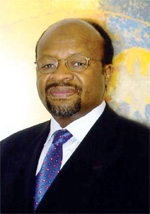






|
Before
the Assembly A
Welcome from the LWF General Secretary
Dear Sisters and Brothers, You may ask, “Why do we need to bring people from around the world to meet together in an Assembly?” Reasons are prescribed in the LWF Constitution, such as electing officers and Council members and acting on reports. Business conducted at the LWF Tenth Assembly will be important in determining future leadership and directions for the Federation’s work. But beyond these requisite constitutional matters lie some deeply theological and missiological reasons. The church (ecclesia)—as the people of God, the body of Christ, and the temple of the Holy Spirit—is by nature an ‘assembly.’ The LWF Assembly enables churches to worship, witness, confer and speak together on matters common to the whole church, and to express their unity as part of the one, universal, new community in Christ. Since 1990, we as the LWF understand ourselves as being more than a loosely affiliated federation of churches. We are a communion of Lutheran churches Previous Assemblies: 1947 Lund, Sweden The Lutheran Church in the World Today 1952 Hanover, Germany The Living Word in a Responsible Church 1957 Minneapolis, USA Christ Frees and Unites 1963 Helsinki, Finland Christ Today 1970 Evian, France Sent into the World 1977 Dar-es-Salaam, Tanzania In Christ—A New Community 1984 Budapest, Hungary In Christ—Hope for the World 1990 Curitiba, Brazil I Have Heard the Cry of My People 1997 Hong Kong, China In Christ—Called to Witness ¦ united through Word and Sacrament. This holds us together in a more profound sense than any constitutional requirements. “Communion with God and communion with one another are…made possible by God’s selfcommunication as it comes to expression in the human acts of preaching the gospel and administering the sacraments.”1 Whenever and wherever we gather in local congregations to hear the Word and celebrate the Sacraments we are reminded that we do so as part of the communion of saints worldwide. This wider communion must become for us more than an abstract, faceless reality. We must be able to touch, hear, taste and experience this reality firsthand. In self-giving love, God became incarnate in a human being. Similarly, the communion we share with one another must become incarnate, in very human, face-toface kinds of communication and interactions that enrich, test out and deepen what it truly means to be a communion. Today, through computer and other information technology, we are increasingly connected through networking, but all fall short of the importance of gathering together at the same time, in the same place, as living beings. Present with one another, we realize who our sisters and brothers in Christ actually are, and our generalizations are challenged. In living and working with one another over several days, we recognize our significantly different situations and perceptions, as well as what we share in common. Through God’s grace, we are able in solidarity to share our pains and joys, our burdens and gifts, and in that process begin to understand what Luther was describing when he explained what occurs through the Sacrament of the Altar:
Here we receive the promise, a foretaste of God’s communion with the whole of creation in the coming reign of God. This coming together in Christ, through the power of the Holy Spirit, has important ongoing consequences for our life together as churches throughout the world.
This Triune God also sends us out for the sake of God’s mission in the world. Attending to what that mission means ‘for the healing of the world’ is a central reason why the LWF member churches will assemble in Winnipeg, Canada. As we do so, we are held together by the power of God’s Spirit, such that we are able to speak honestly about the challenges facing us and our churches, and to discern, debate and decide how these will be addressed through our ongoing work as a communion: How will we bear faithful witness in word and deed ‘for the healing of the world?’ How will we address the tensions and problems we face within our churches and societies? How can this Lutheran communion of churches, as part of the wider church, further God’s allencompassing mission in and for the sake of the world? I look forward to seeing, and being with, those of you who will assemble in Winnipeg. Rev. Dr
Ishmael Noko Notes [Site Map] [LWF Assembly Home] [Links] [LWF Home] |

|
